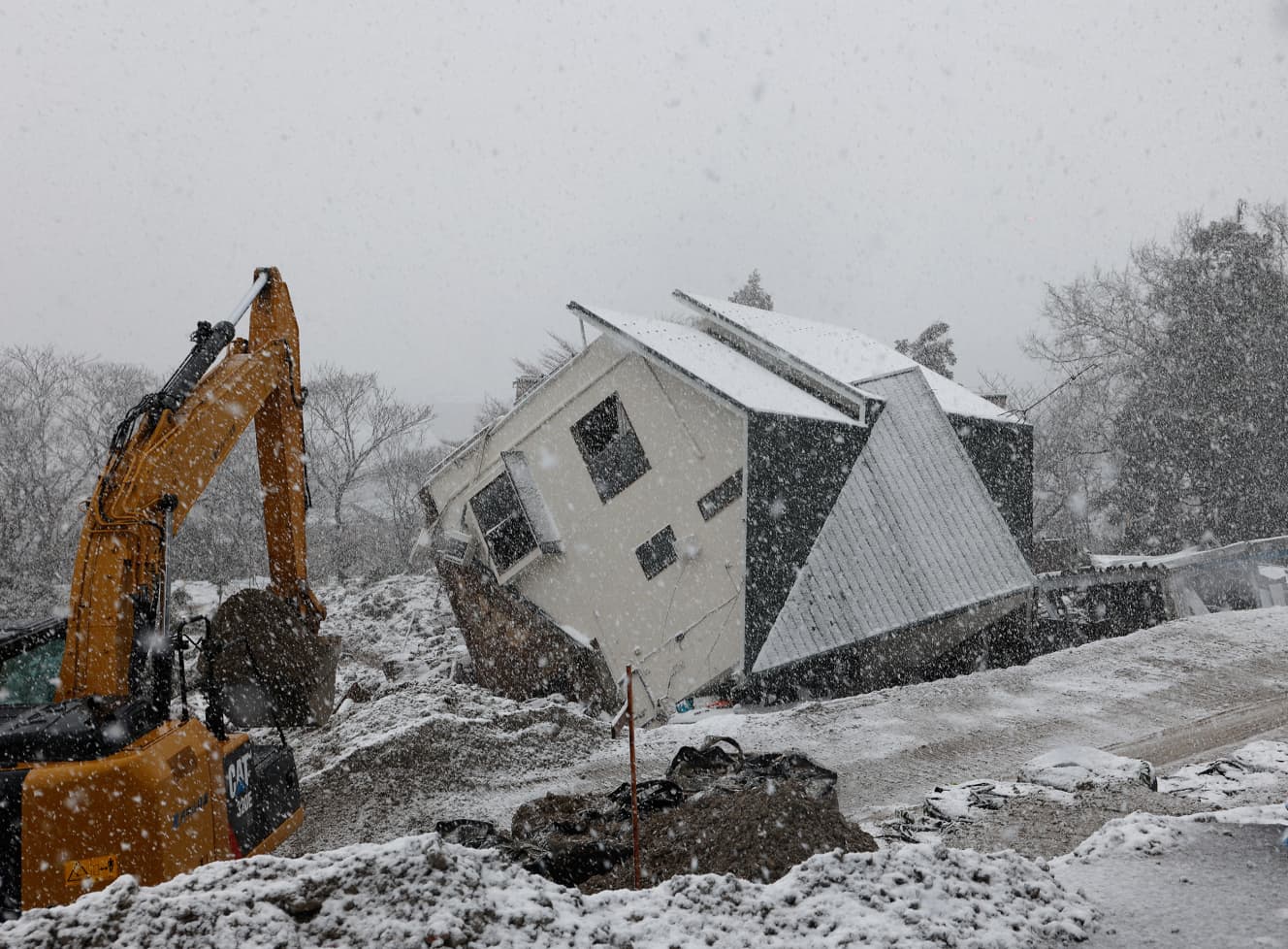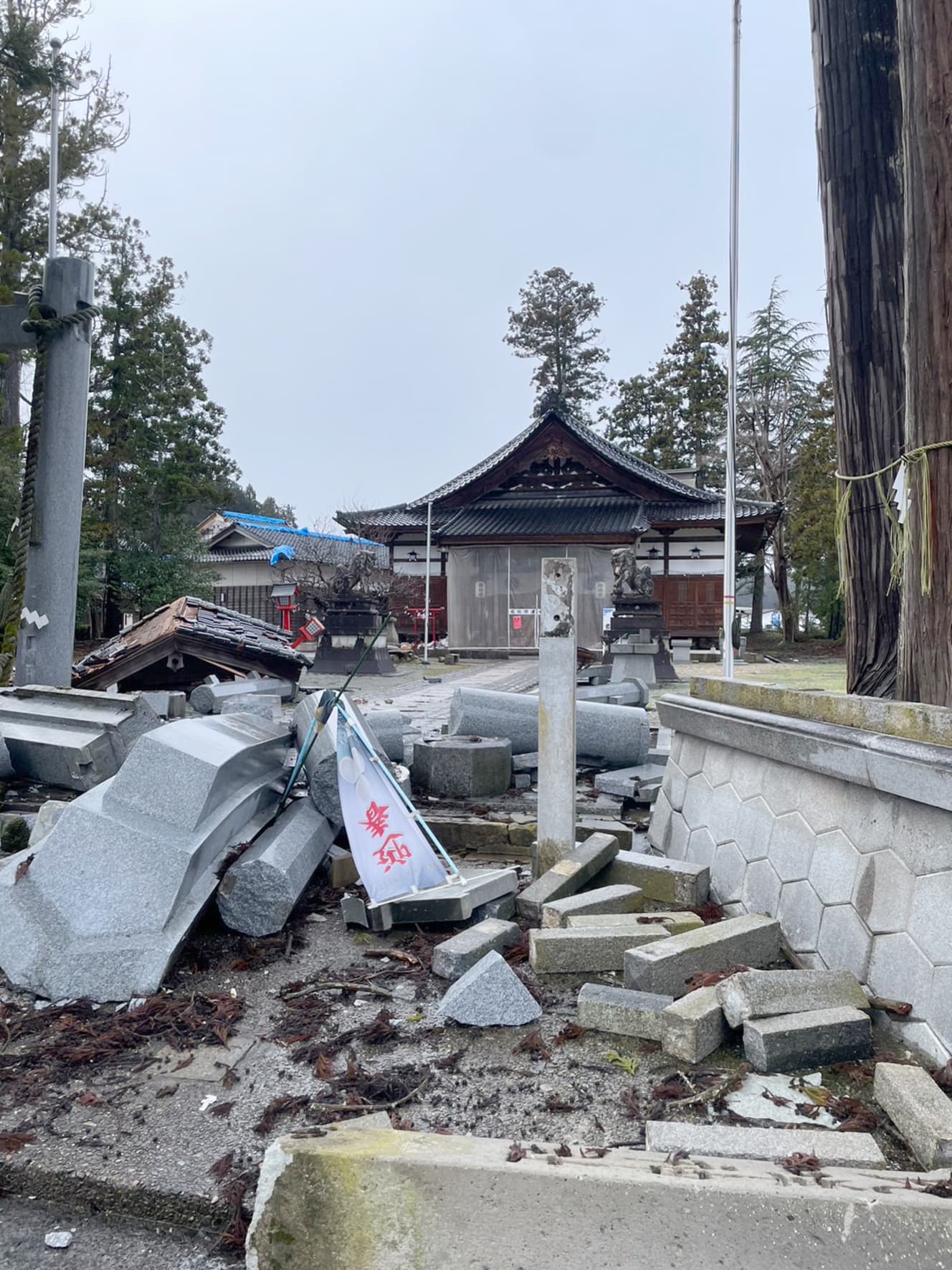Noto Peninsula Earthquake: Exploiting Snow-Stricken Victims as ‘Opportunities’ – Despicable Villains Laugh in Face of Tragedy
Rogue businessmen and swindlers gathered and did whatever they wanted, including selling water pipes that "won't be usable until summer.

“Are you from the press?”
As I was walking through a residential area in Anamizu Town, Ishikawa Prefecture, located in the center of the Noto Peninsula, a pair of young police officers approached me from behind. When I showed them my ID and business card and told them that I was here for an interview, the policemen confided in me, “Recently, we have been receiving a lot of calls from people posing as media representatives.”
“Lately, people pretending to be media personnel have been coming a lot. Some even come with cameras and enter other people’s properties without permission.”
After the Tokyo Metropolitan Police officers, who came to support, left, a patrol car from the Akita Prefectural Police could be seen passing by. Currently, many police officers are patrolling the streets locally. This is because reports of burglaries and suspicious individuals have been increasing.
On January 1st, a magnitude 7.6 earthquake struck the Noto Peninsula. Particularly hard-hit areas include Wajima City, Suzu City, and Nanao City, with the entire Noto Peninsula still bearing the scars of the disaster. Amidst this, it’s reported that unscrupulous individuals taking advantage of the chaos and resembling fraudsters are rapidly increasing in the disaster-stricken areas. Approximately one month after the unprecedented disaster and amidst heavy snowfall on the Noto Peninsula, what is happening now remains a pressing question.
In Wajima City, a self-proclaimed university student from Aichi Prefecture stole premium oranges from a private residence, while in Suzu City, a man in his 30s was arrested for taking a counterfeit sword from a disaster-affected home. It’s reported that suspicious individuals are still lurking around evacuation centers and near collapsed houses, causing anxiety among residents. A man met at a shelter in Nanao City expresses his outrage.
“Since immediately after the earthquake, there have been endless stories about strange men loitering around the neighborhood or receiving weird phone calls at home.”
Near the Wajima Onsen area in Nanao City, a pair of Caucasian men were being questioned by police officers. One of them was holding a single-lens reflex camera, and both were wearing fluorescent orange and green jackets. They were grinning as they underwent questioning. Whether they were merely curious onlookers or tourists wanting attention by posting on social media remains unclear, but disrespectful individuals arriving by rental cars to enjoy “disaster tourism” continue to appear.
About two weeks after the earthquake, an elderly self-employed man in Nanao City received a suspicious phone call from an unknown number with a woman’s voice saying, “We’re here to replace the water pipes.”
“The reason for the water outage in Nanao was due to leakage in the water source, the Tadotori River, and the supply pipes connecting to the city. Even if they had replaced the household water pipes, it wouldn’t have solved the issue of water supply. Since they were suspicious contractors who knew nothing about the local situation, I immediately hung up the phone.”
The water outage in Nanao City is expected to be largely resolved by March (as of January 30th), whereas initially, it was said to last until around summer. The caller on the phone was likely an unscrupulous contractor taking advantage of residents’ anxieties.
There are other examples of suspicious calls. A male company employee who was visiting Nanao City shares the following.
“I have set up my parents’ landline phone to be forwarded to my mobile phone when calls come in while we’re out. One day, a call came in from an unknown person saying they were ‘confirming the situation of the damage,’ and they asked, ‘Where are you right now?'”
After answering that he was at home, the call abruptly ended. The man became more cautious, thinking, “They might have intended to break in if they realized I wasn’t home.”
Even targeting contractors from outside the prefecture.
Not only through phone calls, but also actual visits to residential homes by such contractors have been reported.
According to Ishikawa Prefectural Police, there were 131 consultations regarding suspected illegal door-to-door sales from New Year’s Day to January 23rd.
Among them, what stands out is the malicious business practice claiming to cover the roofs of collapsed houses with blue sheets. While the market price is around 30,000 yen, there have been reports of cases where individuals were charged a high fee of 120,000 yen by contractors.
“Contractors came to our neighborhood as well. While it’s true that there was a shortage of blue sheets immediately after the earthquake… they always say, ‘Although it’s in short supply, we’ll prioritize your job,'” said a male farmer from Anamizu Town.
In addition to blue sheets, suspicious roofing renovation contractors were also rampant in the disaster-stricken areas.
“Your roof tiles are misaligned.”
On January 4th, a young, rough-looking man suddenly visited the home of an elderly woman in Hakusan City. As soon as the elderly woman, who lived in this house, mentioned calling her daughter who happened to be visiting, the man promptly left.
“The man claimed that while he was working on the utility pole across the street, he coincidentally noticed the damage to our roof,” said the daughter of the elderly woman. “But he didn’t even have a ladder, just holding a smartphone in his hand. My mother’s car parked in front of the house had a Maple Leaf Mark indicating an elderly driver. I believe he was specifically targeting homes of elderly people, using that as a marker.”
According to the Ishikawa Prefectural Police’s Life Safety Planning Division, there have been multiple reports of suspicious activities in the disaster-affected areas, including sales calls for earthquake insurance from unidentified companies and individuals trying to enter homes under the guise of inspections.
[“Now it’s cheaper!” “Special offer for today only!” It’s a tactic to rush and pressure people into making a contract.]
At the town hall of Uchinada, adjacent to Kanazawa City, there were posters urging caution against fraudulent business practices, advising people to “consult with others before making a contract on the spot.”
However, scoffing at such advice, the fraudsters devised the following scheme.
“There have been numerous incidents of someone arbitrarily leaving items in front of damaged houses. For example, a clean blue sheet is placed in front of the house. If residents mistakenly assume it’s something distributed by the authorities and use it, they will later be billed for it,” said a male farmer from Wajima City.
According to the Ishikawa Prefectural Police, there have been several reports of cardboard boxes filled with bottled mineral water left in front of doorsteps without being ordered.
Many businesses see the disaster as an “opportunity.” One used car dealer, for instance, is gathering used cars now, targeting those looking to replace vehicles damaged in the disaster. It’s said that many people replace their cars with insurance money after disasters, so they plan to quickly sell the cars they’ve collected at that time.
There are also businesses from outside the prefecture eyeing profit-making opportunities. A recycling company from Aichi Prefecture revealed that they pick up large quantities of wood, scrap metal, antiques, and other items for free from disaster-stricken areas, aiming to resell them for profit.
“We plan to enter the disaster-stricken area at the right time and attach flyers to stationary cars, motorcycles, and collapsed houses with ‘High-priced purchase’ written on them. We don’t actually intend to buy at high prices, though.”
The worst offenders preying on disaster victims in the midst of anxiety and confusion may be even more numerous in the future.










From the February 16, 2024 issue of FRIDAY
Interview: Text: Hironori Jinno (nonfiction writer) PHOTO: Hiroyuki Komatsu